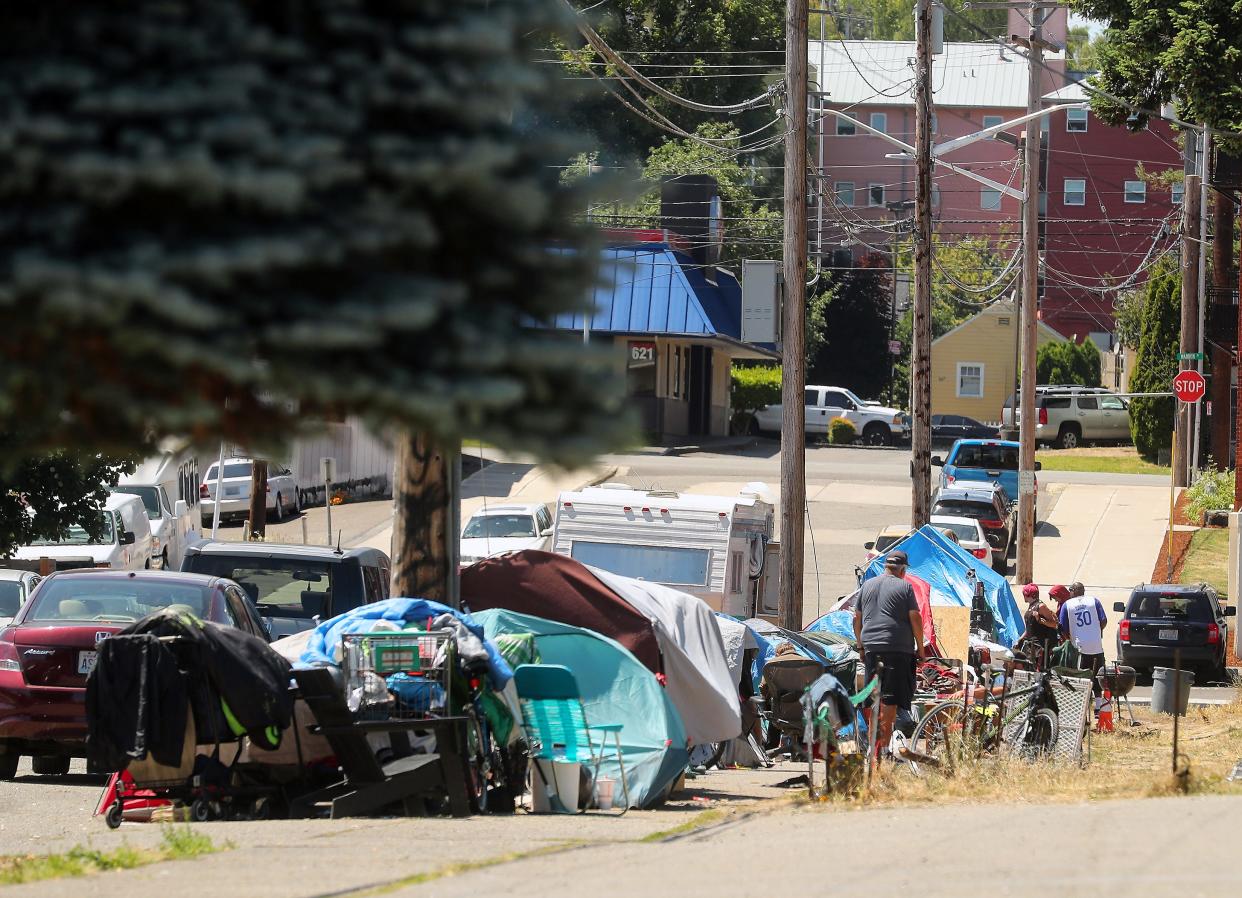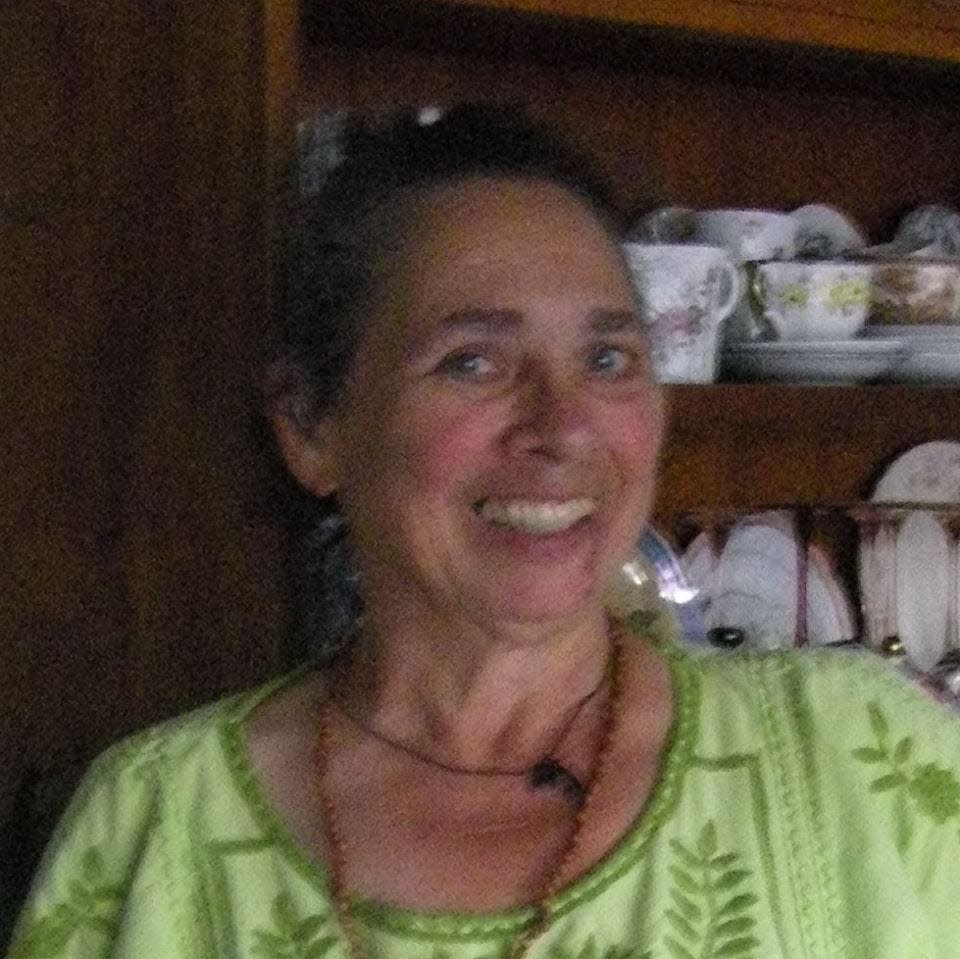As a downtown resident and business owner, I'm all for an urban rest stop

Some of my neighbors live in tents. That doesn't make them any less my neighbors.
My husband and I live on Warren Avenue in Bremerton, and run a small business on Pacific Avenue. Between them, just a few blocks' walk from either one, lies the tent village on MLK Way. Observing the encampment at close hand on a daily basis. We see human beings like ourselves, neighbors sitting together on scavenged armchairs enjoying the sun, or huddling together around a propane fire in winter. We donate products from our store to Food Not Bombs, one of the groups that provides supper twice a week to the village.
At the August 2 Bremerton city council meeting, one woman commented that camping in the city is “completely dystopian” and should be banned. I don't think she understands the meaning of “dystopian.” If you look it up, you know the word refers to “a very bad or unfair society in which there is a lot of suffering, especially an imaginary society in the future, after something terrible has happened.”
In this dystopian present, something terrible has indeed happened: virtually every city in this country, perhaps in the world, has a large population of people who cannot afford housing. Purely financial factors include the long-increasing gap between low-level wages and housing costs; growing speculation in residential property by wealth management firms, with resulting rent increases; and shortages created by demolishing inexpensive housing and replacing it with luxury units. All this is complicated by the fentanyl epidemic and a shortage of treatment options for mental illness. Whatever the reasons, a significant number of Bremerton's citizens are now unhoused.
Among all the unmet needs of the tent village's residents, one that stands out to me, for its denial of basic human dignity, is the lack of restrooms. This is a public health issue as well. Unless we want to return to the Middle Ages, when every city's gutters ran with raw sewage, we as a community must accept that many of our citizens literally have no place to go. On July 3, Reuben Wilkins of the Marvin Williams Recreation Center was quoted in the Sun saying people get “butt naked behind the building.” In another story, published in August, activist Kimmy Siebens of the Bremerton Homeless Community Coalition shared that she's been collecting urine from the RV tanks and other containers the village residents use in place of toilets into her “portable septic tank” and taking it to the wastewater treatment facility herself.
The Bremerton City Council has budgeted $10,000 for portable toilets, but Mayor Greg Wheeler has been advised by the facilities and engineering departments and the city attorney’s office of issues with liability as well as feasibility that prevent him from authorizing the expenditure. Mayor Wheeler has stated in emails to me that, besides his ongoing work to provide more overnight shelter, he is actively researching other nearby locations for toilets.
But toilets are just the beginning. There's the need to wash up, to shower, perhaps to shave, to do laundry. Many unhoused people have jobs, far more of them than uninformed people might guess; it's not easy to get ready for work in a tiny tent without access to clean water. A city employee at the Norm Dicks government office building downtown, who frequently meets unhoused people using the restrooms for personal hygiene, shaving, etc., has to tell them to move on, but feels bad about it. “I wish there were more we could do to help.”
The Salvation Army's day center at Sixth Street and Warren provides the only truly public downtown restrooms, and also offers showers and some laundry service. Captain Dana Walters says, “Our hygiene center is open weekdays from 9 to 11:30 and from 1:15 until 3:15. The last shower is at 2:45 and we take and give out laundry until 3:15. We provide showers, hygiene items like soap, shampoo, razors, towels, washrags, toothpaste, toothbrushes, combs and brushes, and clothing and we average 15 to 25 showers a day... from 8 a.m. until 3:30 p.m. for people to use the restrooms and receive social services. An average of 20 to 30 people come in for services," not including meals.
That's good, but it's just not enough to fulfill the need.
Seattle's Low Income Housing Institute ( LIHI) confronted this problem decades ago, though its primary mission is acquiring and operating housing facilities. After a 1990 study by city staff revealed that Seattle had a severe shortage of public restrooms, LIHI began working to establish a downtown public hygiene center. Despite downtown businesses' opposition, eventually, in 1999, the Urban Rest Stop (URS) opened on the first floor of a building of low income housing at Ninth and Virginia. Since then, the downtown Urban Rest Stop and its newer Ballard location, like Bremerton's Salvation Army, have offered restrooms, showers, free toiletries, and laundry services to unhoused individuals and families. People who own no other clothes than the ones they are wearing are provided with clean overalls to wear while their garments are washed and dried. URS staff estimate that over 60% of their patrons are getting ready for work.
The URS hours are much longer and capacity greater than the Salvation Army's: Monday through Friday, 6:30 a.m. to 5 p.m., with the last laundry at 3:15 p.m. and the last shower sign-up at 4. On Saturday and Sunday, the hours are 8 a.m. to 5 p.m. (The Ballard URS has shorter hours.)
One client's testimonial on the URS website reads: “It’s amazing what clean clothes and a shower can do. It allows me to feel somewhat good enough to remain clean and sober, look for a job and housing. I am a person who has always worked, but ran into a financial jam. Not being able to take showers, have clean clothes, paralyzes the ability to gain even an inch of self worth.”
Until we as a community accept that homelessness is not going away on its own, that it can't be dealt with by sweeping away our unhoused neighbors' encampments only to watch them return – essentially playing whack-a-mole with human lives – we can't move forward to provide solutions, either long-term or short-term.
Long-term solutions are complex and beyond the scope of this piece, but short-term solutions to the lack of restrooms are both urgent and possible. Let's get those toilets out there ASAP, and let's start the conversation about a full-service hygiene center for downtown Bremerton. There will be NIMBYs, I know. But as homeowner and business owner, I am directly, daily, affected by the lack of services, and I wholeheartedly support locating an Urban Rest Stop in my neighborhood.
Alison Slow Loris is a Bremerton homeowner and business owner, who also worked with unhoused people in Seattle for 8 years.

This article originally appeared on Kitsap Sun: Support a hygiene center in downtown Bremerton for homeless residents

